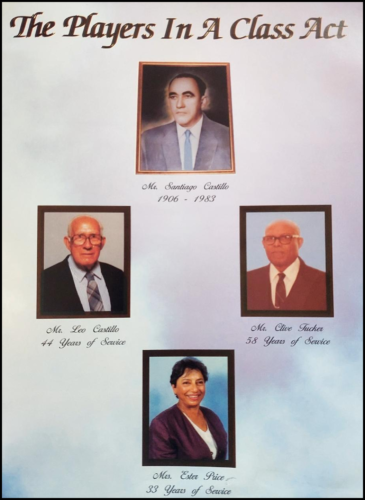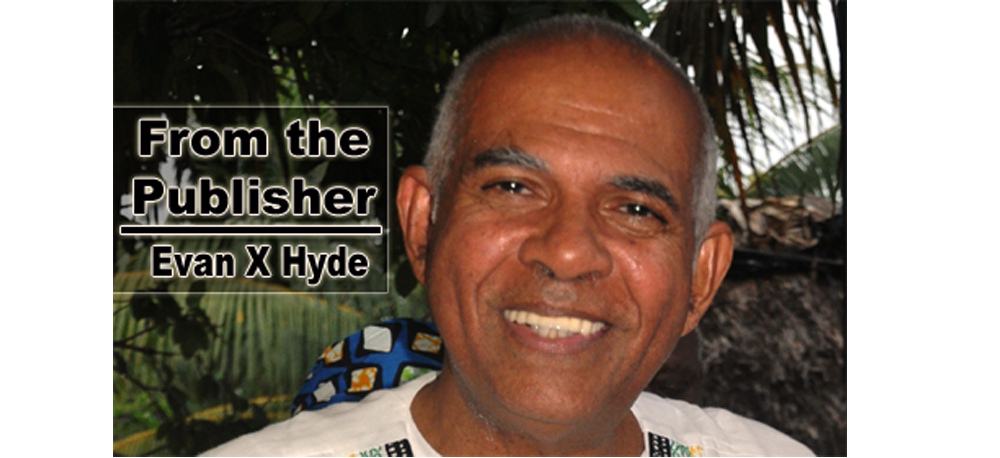Belize has a culture which seemingly delights in promoting rivalries. You remember when we were in primary school in the 1950s, if two boys had any kind of disagreement, the rest of us would gather around and begin chanting, “Knock out di bomb and touch di man.” One of the encircling boys would hold a stone (the “bomb”) or some other object, and the rest would urge the “beefing” boys to get it on, so to speak.
When it comes to something like sports, people have different opinions, and this sparks gambling, wherein people will bet on who will win in a boxing bout, football, basketball, and so on.
When we were growing up here in the 1950s and 1960s, the undoubted leader in business was Santiago Castillo, Ltd. Bob Turton had died in 1955; Isaiah Morter had passed in 1923. For sure, Belize Estate and Produce Co. (BEC) was a giant, but it had a foreign flavor to it. San Cas was the Belizean boss.
My late mother told us that her maternal grandfather, George Lindo, had told her that Santiago Castillo, a native of the outskirts of Orange Walk Town, had begun with a small plantain shop in the capital city, at a time when George Lindo himself was pretty wealthy. He owned rum shops, but died broke because of a serious gambling habit.

In the year 2000, the Santiago Castillo group of companies published a magazine history of their businesses, and this is what they said: “Santiago Castillo Limited started as a sole proprietorship import commission business under the ownership of Mr. Santiago Castillo, at the tender age of 19. It grew rapidly until the hurricane of September 10, 1931, which destroyed Belize. Not being insured, Mr. Castillo picked up the pieces and started all over again. His business progressed steadily until the start of World War II in 1939. During the war years, importation became risky business. Merchant ships ran the risk of being torpedoed. Importation halted and the country of Belize quickly suffered a shortage of basic food items.
“Mr. Castillo, with his zeal for business and his understanding of Risks vs Reward, used his modest savings and chartered a ship, filled with basic food items, destined for Belize. Unable to buy marine insurance because of the war, his risk was compounded. Luckily, his plan worked and was repeated one more time. This catapulted his business to a position of strength and gained him the respect of the business community. In 1959 his business was incorporated under chapter 206 of the laws of Belize as a limited liability company.”
One of the reasons for Mr. Castillo’s success in Belize City, to most people’s minds, was that he, a Mestizo, had a Creole partner by the name of Clive Tucker close to him, and he had prominent Creole employees like Cyril Gibson, Bertie Ellis, Johnny Chessman, Roy Dixon, and so on. So the San Cas company had a lot of credibility amongst the then majority Creole population in the city.
The Bowen group of companies was limited to a lemonade bottling factory named Crystal until they became a franchise of the transnational behemoth, Coca Cola, sometime in the early 1960s. Barry Bowen then spearheaded the creation of the Belize Brewing Company (Belikin), which acquired a development concession from the Government of Belize in 1969.
Challenged by Charger for beer production/distribution in the middle 1970s, Bowen smashed that group, and then began growing rapidly in the 1980s. So that, by the early 1990s, the introduction of television in Belize having destroyed San Cas’ profitable Palace and Majestic Theater movie houses, it seemed to outsiders that the Bowen group was challenging the San Cas group for business hegemony in Belize. (Benny’s was not yet a player in the game.)
The subject of this column came up when my youngest daughter and I were discussing the early stages of World War II, when German submarines (also called U-boats) were wreaking havoc on British merchant shipping in the Atlantic. The United States did not enter the war on Britain’s side until 1941, but in 1939 and 1940, the British vitally needed goods shipped from the United States and Canada.
The story that is never told in Belize has to do with the fact that two prominent “Belize white” families were caught selling fuel to German submarines outside the Barrier Reef. In other words, they were traitors. My stats are that they were treated leniently by the British authorities, in that all that was done to them was that they were quarantined in Jamaica for the rest of the war.
Since San Cas “blew up” in size during and after the war, it always seemed to me that Mr. Castillo himself must have had a special deal with the British. The official San Cas story, as quoted earlier in this column, is that he took risks which worked out well for him.
Whatever the case, the British, in the person of Lord Michael Ashcroft, are very, very powerful in Belizean business again. Bowen and Bowen are still very huge, while Benny’s has grown rapidly in the last three decades. Then, there are the Chinese and the Indians, about whom I know nothing. Oh, I forgot to mention the Atlantic Bank group of companies, and the oligarchs from down south.
Mr. Castillo suffered a series of strokes, beginning in 1976, and died in 1983. His third wife has been running the businesses for some time, but the business landscape in Belize has definitely and dramatically changed. The San Cas group still has a special place in the affections of older Belizeans, but this is no longer a San Cas town.

